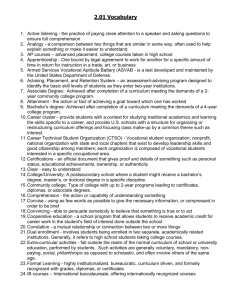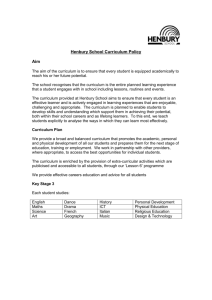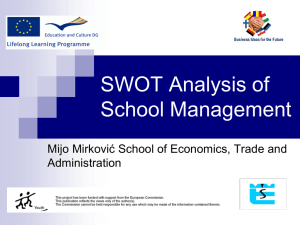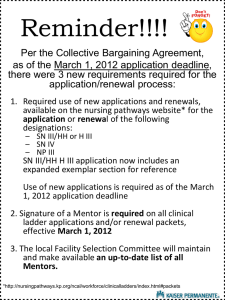Curriculum Renewal in Malaysia
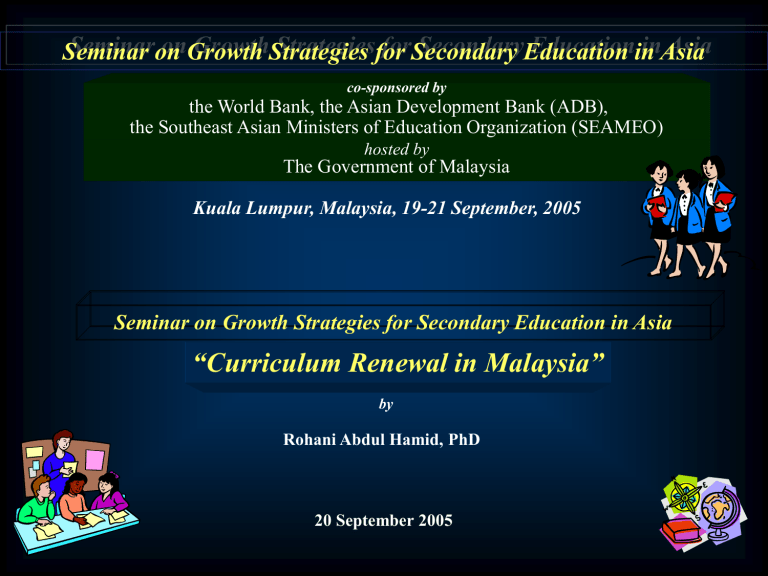
Seminar on Growth Strategies for Secondary Education in Asia co-sponsored by the World Bank, the Asian Development Bank (ADB), the Southeast Asian Ministers of Education Organization (SEAMEO) hosted by
The Government of Malaysia
Kuala Lumpur, Malaysia, 19-21 September, 2005
Seminar on Growth Strategies for Secondary Education in Asia
“Curriculum Renewal in Malaysia” by
Rohani Abdul Hamid, PhD
20 September 2005
“… ; no one knows on what principle we should proceed - should the useful in life, or should virtue, or should the higher knowledge, be the aim of our training; all three opinions have been entertained”
(Aristotle, Politics , B.VIII).
BACKGROUND TO CURRICULUM RENEWAL
EDUCATION IN MALAYSIA
TERMS OF REFERENCE / MANDATE FOR CURRICULUM DEVELOPMENT
NATIONAL PHILOSOPHY OF EDUCATION
… developing the potential of individuals in a holistic and integrated manner so as to produce individuals who are intellectually, spiritually, emotionally and physically balanced and harmonious, based on a firm belief in and devotion to
God... knowledgeable and competent, who possess high moral standards, ..
CURRICULUM IN THE 1996 EDUCATION ACT
“..... an educational programme ... which encompasses all the knowledge, skills, norms, values, cultural elements and beliefs to help develop a pupil fully with respect to the physical, spiritual, mental and emotional aspects as well as to inculcate and develop desirable moral values and to transmit knowledge”
BACKGROUND TO CURRICULUM RENEWAL
NATIONAL DEVELOPMENT PLANS
AND CURRICULUM RENEWAL
VISION 2020 – developed nation status
K- ECONOMY MASTER PLAN – education to produce knowledge workers
MOST RECENT CURRICULUM RENEWAL
2002 – 2003 SECONDARY EDUCATION REFORM
2002 – CURRICULUM REVISION FOR ALL SUBJECTS
2003 – SCIENCE AND MATHEMATICS IN ENGLISH
BACKGROUND TO CURRICULUM RENEWAL
MAJOR CURRICULUM CHANGES
LATE 1990S AND EARLY 2000S
TO MEET CHALLENGES OF ICT AGE AND GLOBALISATION
Late 1990s and early 2000s saw major changes in curriculum and instruction in Malaysian schools
ICT Literacy as a programme
ICT-Integrated teaching-learning : Computers-in-education
Smart Schools – individualised, self-directed learning
School Computerisation Project – computer labs
Lengthening of Basic Education from 9 to 11 years
A Knowledge-Based Learning Culture
Emphasis on Critical and Creative Thinking Skills
MALAYSIA’S DEVELOPMENT - RAPID CHANGES
Curriculum Development : continuously keeping abreast of a rapidly changing society
Rapid changes: School has to ‘CATCH-UP’ with rapid (& uneven) social and economic developments within the country
Significant Rural and Urban Differences
EDUCATION A MEANS OF
NARROWING RURAL-URBAN DIVIDE
Striking a Balance between dealing with basic problems, e.g. access to schools in remote areas, while forging ahead with programmes to develop future scientists and technocrats
POINTS FOR DISCUSSION
11 YEARS BASIC EDUCATION
CORE CURRICULUM & ELECTIVES
GLOBALISATION / K-ECONOMY
VOCATIONAL EDUCATION
NEW CURRICULUM AREAS
NEW CLASSROOM APPROACHES
ISSUES AND CHALLENGES
PROMISING APPROACHES
11 YEARS BASIC EDUCATION
CORE CURRICULUM & ELECTIVES
11 YEARS BASIC EDUCATION
11 years schooling (with automatic promotion) following 1996 Act
9 years
Basic
Education
Over 30% leave school to enter workplace after 9 years
11 years Basic Education
The over 30% of students who would normally leave school take vocational electives
Expansion of vocational education named Basic Industrial Skills in academic schools
Better qualified workforce for industrial economy
Living Skills a precursor of
Basic Industrial Skills
Starting Point: Course of Studies for British
Exams guided by Exam Syllabuses
Curriculum replaced Syllabuses in mid 1970
STATUS
Core subjects remain stable
Increase in Elective Subjects
Same 4 TRACKS / streams at upper secondary
HOWEVER, CONTENT OF SUBJECTS HAS UNDERGONE INTERNAL
CHANGE TO KEEP UP-TO-DATE WITH EMERGING KNOWLEDGE
AREAS: e.g. GENERAL SCIENCE – NEW EMPHASIS ON
ENVIRONMENT, RENEWABLE ENERGY & CONSERVATION; BIOLOGY
– WIDENING SCOPE, e.g. GENETICS, TO INCLUDE HUMAN GENOME,
GENETIC ENGINEERING & BIOTECH
CORE SUBJECTS
AT UPPER SECONDARY LEVEL
Core subjects remain stable
CORE
MALAY
ENGLISH
ISLAMIC EDUCATION
MORAL EDUCATION
MATHEMATICS
SCIENCE
HISTORY
PHYSICAL EDUCATION
HEALTH EDUCATION
CIVICS EDUCATION
FOUR CURRICULUM TRACKS
AT UPPER SECONDARY LEVEL
TRACK I.
SCIENCE
ADDITIONAL SCIENCE
BIOLOGY
PHYSICS
CHEMISTRY
I
II
III
IV
SCIENCE
ARTS
TECHNICAL/VOCATIONAL
ISLAMIC STUDIES
TRACK II.
ARTS & LANGUAGE
BASIC ECONOMICS
PRINCIPLES OF ACCOUNT
COMMERCE
HOME SCIENCE
INFORMATION TECHNOLOGY
ARABIC
ADVANCED ARABIC
CHINESE
TAMIL
SCIENTIFIC ENGLISH
TRACK III.
BASIC ACCOUNTING
BASIC ECONOMICS
COMMERCE
AGRI SCIENCE
MECH ENGINEERING
TECHNICAL & VOCATIONAL
CIVIL ENGINEERING
TECHNICAL DRAWING
ENGINEERING TECH
HOME SCIENCE
INVENTIONS, ETC.
CONSTRUCTION INDUSTRY
AGRICULTURE
HOME ECONOMICS
COMPUTER APPLICATIONS
MANAGEMENT AND ENTREPRENEURSHIP
TRACK IV.
ISLAMIC STUDIES
AL-QURAN & AS-SUNNAH STUDIES
SYAR’IAH ISLAMIAH STUDIES
ETC.
GLOBALISATION / K-ECONOMY
VOCATIONAL EDUCATION
DEMANDS
RENEWAL
Science and Mathematics in English
Science and Mathematics in English
- Knowledge Access
English - Global Communication
Expansion of Vocational Education to broaden opportunities for slow learners
EXPANSION OF VOCATIONAL EDUCATION
EXPANSION OF VOCATIONAL EDUCATION: BASIC
INDUSTRIAL SKILLS OFFERED IN ACADEMIC SCHOOLS
DOMESTIC CONSTRUCTION
FURNITURE MAKING
SIGNAGE
SERVICING ELECTRICAL APPLIANCES
DESIGN & TAILORING
CATERING SERVICE
LANDSCAPE & NURSERY
FOOD CROP CULTIVATION
DOMESTIC PLUMBING
ARC & GAS WELDING
MOTORCYCLE SERVICING
GERIATRICS SERVICE
FOOD PROCESSING
AQUACULTURE & PETS
MULTIMEDIA PRODUCTION
COMPUTER GRAPHICS
DOMESTIC ELECTRICAL WIRING
AUTOMOBILE SERVICING
AIR CONDITIONING SERVICING
FACIAL & HAIR CARE
BASIC INTERIOR DECORATION
INFANT CARE & EARLY EDUCATION
Modular, hands-on approach
Modular school-based assessment
Management and entrepreneurship important components
VOCATIONAL SUBJECTS IN TECHNICAL SCHOOLS
PRACTICAL MACHINERY WORKSHOP
MACHINERY OPERATIONS
GEOMETRIC AND MACHINE DRAWING
BUILDING CONSTRUCTION TECHNOLOGY
BRICK AND WOOD WORK
GEOMETRIC DRAWING AND BUILDING
AUTOMOBILE SERVICING AND
MAINTENANCE
GEOMETRIC & AUTOMOTIVE DRAWING
AIRCONDITIONING TECHNOLOGY
GEOMETRIC & AIRCONDITIONING
CONSTRUCTION
ELECTRICAL FITTING & CONTROL
GEOMETRIC AND ELECTRONIC DRAWING
METAL WELDING & FABRICATION
WELDING WORK
GEOMETRIC AND METAL FABRICATION
DRAWING
AUTOMOTIVE TECHNOLOGY
LANDSCAPE HORTICULTURE
AGRICULTURE ENGINEERING
CHILDCARE
ELECTRICAL TECHNOLOGY
DRAWING
CATERING TECHNOLOGY
BASIC INFORMATION PROCESSING
FOOD PREPARATION & SERVICES
FASHION DESIGN & TAILORING
BEAUTY TECHNOLOGY
CUTTING AND HAIRSTYLING
BAKING AND CONFECTIONERY
BREAD AND PATISSERY
FOOD PRODUCTION
POULTRY PRODUCTION
FARM MANAGEMENT
NURSERY & CHILDCARE
FASHION DESIGN & TAILORING
NEW CURRICULUM AREAS
NEW CLASSROOM APPROACHES
New Trends
Curriculum Renewal
Renewable
Energy and Energy
Efficiency
Inventions
Environmental
Education
ICT
Literacy
Generic Skills / Core
Competencies integrated
Across the Curriculum
International
HIV/AIDS and Sex
Education
Languages
Outcome of reponsiveness to emerging new knowledge areas:
Citizenship
Education
Stronger
Moral, Religious &
Civics Education
Human Rights
Learning How to Learn
Drug
Prevention Agricultural
Studies
NEW SUBJECTS
ICT Literacy
to develop ICT literacy among students and the ability to operate and use common applications word processing graphics spreadsheet database management systems programming
International Languages
for communicative purposes in global age and widen opportunities for higher education
The Foreign
Languages
Curriculum
JAPANESE
Number of schools offering international languages limited but will be expanded as teacher supply improves
FRENCH
GERMAN
NEW KNOWLEDGE AREAS
Renewable
Energy and Energy
Efficiency
HIV/AIDS and Sex
Education
International
Education
Environmental
Education
Stronger
Moral, Religious &
Civics Education
Human Rights
Education
New
Emphasis on
Agricultural
Studies
Generic Skills / Core
Competencies integrated
Across the Curriculum
Learning How to Learn
/ Lifelong Learning
1
2 Integrated across subjects of the curriculum and taught when appropriate
3
4
A Component within a subject
Implemented as Co-
Curricular Activities
Implemented as Out-of-
School (field) Activity
HIV/AIDS Prevention
Environmental Education
Renewable Energy and Energy
Efficiency etc
Drugs Prevention
Study Skills – Learning How to
Learn etc
Science Projects
English Language Activities –
Choral Reading, etc
Local Studies
(History, Geography)
TIME ALLOCATION
Note! ADDED KNOWLEDGE
AND SKILLS WITHIN SAME
TIME ALLOCATION
NEW CLASSROOM APPROACHES
IMPLEMENTATION IN PROGRESS
SCIENTIFIC INQUIRY TO ENCOURAGE R&D
CULTURE AS PART OF NATIONAL CHARACTER
Scientific inquiry leading to conclusions and discovery
Laying Basis for
Knowledge Work
- Exploration, Creativity and Innovation
Technology Creation in Malaysia
Building a Class of Technocrats
Combines Theoretical with the Practical
DESIRED COMPETENCIES - thinking skills, knowledge application, exploration, inventiveness, competitiveness, entrepreneurship and risk-taking
NEW CLASSROOM APPROACHES
Experiential Learning
Out-of-School Programmes
Project Work
Differentiated Learning
Smart school individualised self-directed learning culture (late 90s)
Use of ICT as a Teaching-Learning Tool
Science and Mathematics in English : 2003 - 2008
HARDWARE COURSEWARE
Schools are provided with PC Notebooks,
LCD, Trolleys, Screen and ICT Peripherals
Teaching courseware is produced (Private Sector collaboration) to help teachers deliver lessons in English effectively
DIFFERENTIATED PROGRAMMES
Voucher system for extra coaching for weak students from poor families
Catch-up classes to prepare for standardised examinations is common practice and very effective. Sometimes also driven by local government.
There is a Special Education Department that deals with Remedial
Programmes, Special Education and Education for Gifted Children
Special Education well developed for serious learning disabilities (e.g.
Dyslexia, Attention Deficit,) but programmes for normal children who are slow learners are not that well developed
Programmes for gifted children lacking
ISSUES AND CHALLENGES
CHALLENGES WITH REGARD TO
EFFECTIVE IMPLEMENTATION
IS CURRICULUM
RENEWAL DELIVERING
RESULTS?
CHECK
CURRICULUM &
ORGANISATION
CHECK
TEACHERS’
CAPACITY
CHECK
DISSEMINATION
SYSTEM
(TRAINING)
CONTINUOUS MONITORING AND SUPPORT FOR
EFFECTIVE IMPLEMENTATION OF REFORMS
CURRICULUM CONTENT & ORGANISATION
CHECK
CURRICULUM &
ORGANISATION
Coping with curriculum load by restructuring content e.g. by integrating subjects within knowledge field
Integrating Subjects e.g. social science, earth sciences, etc. has not caught on here
Integrating Areas Across the Curriculum
There is reason to believe that teachers do not implement areas across the curriculum rigorously enough
Time Allocation
Inclusion and organisation of new content within available school hours
RESEARCH & DEVELOPMENT
CHECK
CURRICULUM &
ORGANISATION
R&D TO INFORM CURRICULUM
DEVELOPMENT
Urgent need for research data and information specific to curriculum development needs for local situation: curriculum content, organisation & time allocation
CHECK
TEACHERS’
CAPACITY
CHECK
DISSEMINATION
SYSTEM (TRAINING)
Problem of teacher quality
R&D ON TEACHER QUALITY & EFFECTIVENESS
OF TRAINING FOR DISSEMINATION
STATUS OF DIFFERENTIATED PROGRAMMES
More concerted effort needed to develop
Differentiated Programmes so that students’ employment and life opportunities are enhanced
Gifted children’s programme important to realise K-economy
TRY-OUTS of programmes for gifted children recommended
Examination Dominance
& School-Based Assessment
Move towards School-Based Assessment (SBA) introduced in 1980s with New Primary and Secondary Curriculum did not result in making school exams becoming less important
School Conditions - not conducive to the close type of monitoring under SBA and teachers feel documentation tedious
Employers and Higher Ed Institutions use National systems as indicators of student achievement and individual competence
Lack of faith in validity of school-based assessment results
School-Based Assessment
Fully
Partially
Vocational Subjects 100% School-Based Assessment managed by the Examinations Syndicate
Science Practical Exam
Practical Exam for Islamic Religious Education
RESEARCH & DEVELOPMENT ON ASSESSMENT
Flexible Assessment Approaches to Expand
Opportunities & Enhance Creativity
As pointed out by the World Bank, a more flexible, rational and equitable approach to exams and certification has to be developed (for Malaysia) that can accommodate constraints of current school conditions
If the assessment system (e.g. SBA) places value on inquiry-discovery and creativity, these qualities will be effectively enhanced
RECOMMENDED as an Area that the World Bank can look into
MALAYSIAN GRID FOR LEARNING
PUBLIC-PRIVATE SECTOR
PARTNERSHIPS
MALAYSIAN GRID FOR LEARNING www.mygfl.gov.my
MyGfL: A one-stop education gateway for e-learning initiatives, intended to enhance the formal education process (teaching, learning and assessment) by :
- providing online educational resources (content, information, services and expertise) to teachers and pupils to use and share
- leveraging and integrating ICT tools available in schools and
Teacher Training Colleges to enhance teaching-learning www.mygfl.gov.my
TRE/VTC: Teaching-
Learning Resources
MyGuru
Teachers’ professional network
MyTest
Assessment
Materials
MyGfL: CREATING OPPORTUNITIES
TRE/VTC: Teaching-Learning Resources
Ready availability of a variety of materials allows teachers greater choice in differenting learning by developing different learning tracks for individual or groups of students
MyGuru:
Teachers’ network
Enhancement of teachers’ professionalism
MyTest:
Assessment
Materials
School based item banks to build & share quality assessment
MyGfL: An e-learning project that bridges the digital divide
MyGuru: Helping to upgrade
Teachers’ Professionalism
Enables Individualised
Instruction to enhance Learning
PUBLIC-PRIVATE SECTOR PARTNERSHIPS
Strategic Public / Private Partnerships
Scope: support educational initiatives / development with help from the private sector, e.g. privatisation
FORMAL /SCHOOLS
e-learning initiatives, e.g. Mobile computer lab
NIE/newspaper-in-education –
New Straits Times
Just English Magazine / Centres i-earn
NONFORMAL EDUCATION
Plan for online courses for the community
A mechanism needed at MOE level to drive Public/Private Sector Partnerships so as to tap into this potential
MALAYSIAN STUDENTS AS MEMBERS
OF THE GLOBAL COMMUNITY
Stronger
Moral, Religious &
Civics Education
International
Education
Greater emphasis on Civics Education and
Education for International Understanding will bring Malaysian children closer to other children in the global community and enables them to be
United in working towards Common Goals such as Preserving the Environment and World Peace


